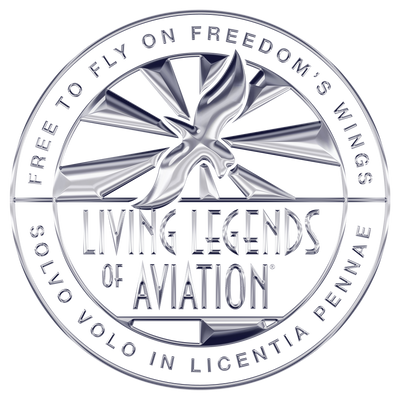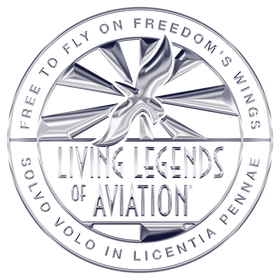SIR RICHARD BRANSON

He called Boeing to see if they had any "secondhand 747s." Secondhand and 747 aren't two things one naturally places togeth- er, but this is how he started his first airline. Not uncommon to aviation history, uninhibited thinking such as "secondhand 747" has led to new and special things. Over the last three decades, Sir Richard Branson has passionately contributed to aviation, becom- ing a legend, through his bold and unrelenting bets led by his entrepreneurial charisma.
Sir Richard Branson's Virgin blog lists Peter Pan as his number seven all-time favorite read. One through six are also children's books and adventure is a solid theme up to number fifteen. Peter Pan, originally authored by J.M. Barrie in 1911, as Peter and Wendy, is the classic about a boy who magically flies, never grows up and lives on a small tropical island with friends. Pan is among the more charming adventure stories ever written, however, it wouldn't be complete without Pan flying.
Waiting in Puerto Rico for his flight to board for the British Virgin Islands where a fashionable lady friend awaited, a few number of Branson's fellow passengers showed up, and so the airline canceled the flight. Frustrated by the airlines disregard for its customers, yet not deterred, Branson hired a plane on the spot, borrowed a blackboard, somewhat jokingly wrote "Virgin Airlines –$39 one way to BVI" then, charmingly walked around looking for people who had also been bumped offering a resolution to their travel plan's discontentment. He filled his first plane and a short time later Virgin Airlines was born with its first "secondhand 747" leased from Branson's new friends at Boeing.
Virgin Airlines differentiated itself by simply being better to the customer. It offered limo rides to the airport. It was the first to install televisions on the back of headrests, and bars were available for passengers to have a drink. However, later on, predictably, Virgin's accountants insisted on eliminating such things to reduce hundreds of millions of dollars of expenses for greater profitability. Branson's mum was a stewardess on the first commercial airline, and Branson's value recognition of providing a special flying experience reinforced Virgin's commitment to making flying a fun time as it had often been in the past when it was a new experience for the public. Branson speculated if Virgin Airlines eliminated the fun things out of corporate normalcy, it would also eventually eliminate its eccentric customers. Today, various Virgin airlines around the world fly 32 million passengers annually, bringing in roughly nine billion dollars in revenue and are the envy of the commercial airline industry. Receiv- ing many prestigious awards annually, Virgin maintains a loyal family of flyers and employees who are often photographed having much fun while flying, sometimes with Dr. Yes himself.
Sir Richard Branson's early commitment to aviation is evident in one event in the early nineties–the sale of Virgin Records for one billion dollars. Branson has likened the moment of running down Ladbroke Grove with both a billion dollar check, and tears in hand, to the idea of selling his children. Virgin Records was a business he started from scratch by compounding earlier entrepreneurial efforts. Virgin, in short order reached the top of the music industry, representing superstars such as Phil Collins and Janet Jackson. It's difficult to imagine selling a high margin, simple business to become more involved in a highly regulated business with seemingly
unlimited risk. But this was exactly Branson's choice: trading the Sex Pistols and The Stones for Boeing leases and aviation permits. Freeing up capital through the timely sale of Virgin Records to Thorn EMI liberated Branson to pursue more adven- turous things in a direction of natural inclination–aviation and space travel. Branson reflected on this auspicious decision to sell the record business to focus on the flying business and concluded thefollowing: "We wouldn't be building spaceships today if it hand't been for that (sale) so it was the right decision."
Sir Richard Branson's commercial aviation successes coupled with a manifest destiny approach to space travel led to the founding of Virgin Galactic in 2004, which has produced signifi- cant commercial and scientific aviation progress. Virgin Galac- tic's team of disrupters has focused on more efficient ways to travel people and satellites to space and it has discovered an old friend in the process.
Branson's beloved 747 found another home at Virgin Galactic as a launch vehicle for satellites. Cosmic Girl, a modified 747-400, will carry LauncherOne, a missile like orbital launch vehicle, to roughly 35,000 feet where it is then released from the wing. LauncherOne then self-powers by rocket stages to orbit. When in orbit, LauncherOne deploys the customer's satellite to where the customer predetermines. Meanwhile, Cosmic Girl returns to Earth by runway landing.
Conventional satellite launchpads located on Earth, such as Cape Canaveral, are extremely limited by scheduling, regula- tion and cost, and weather. Therefore small teams, companies and individuals are often unable to launch satellites, or simply entertain the idea. Currently, one less expensive option is "hitchhiking" on more expensive missions as a passenger but this has significant drawbacks. Hitchhiking requires secondary satellites to be released wherever the primary satellite's target is, and this is usually less than ideal. Cosmic Girl will improve cost, time, payload, effectiveness and the general feasibility of launching satellites into space. By improving the criteria associ- ated with successful satellite launches into orbit, more people, schools and companies will have the ability to do the things they want to do in space with cubesats and microsatellites. Virgin Galactic through Cosmic Girl and LauncherOne will open space to impatient space adventurers and Earth disrupters largely through cost reduction–no small feat and one the Virgin Airlines' accountants from the old days may appreciate.
Sir Richard Branson's uninhibited thinking, financial sacrifices and entrepreneurial charisma have ultimately led to the pursuit of the most exciting scientific and commercial project: space travel for Earthlings. Dr. Yes and Virgin Galactic have received deposits from nearly 700 inspired space travelers from Millenni- als to Greatest Generationers. Sir Richard Branson's ultimate
contribution to aviation and humankind, may be, simply, inspir- ing others to travel to space.
"The moment you doubt whether you can fly, you cease for ever to be able to do it."
~J.M. Barrie, Peter Pan.

